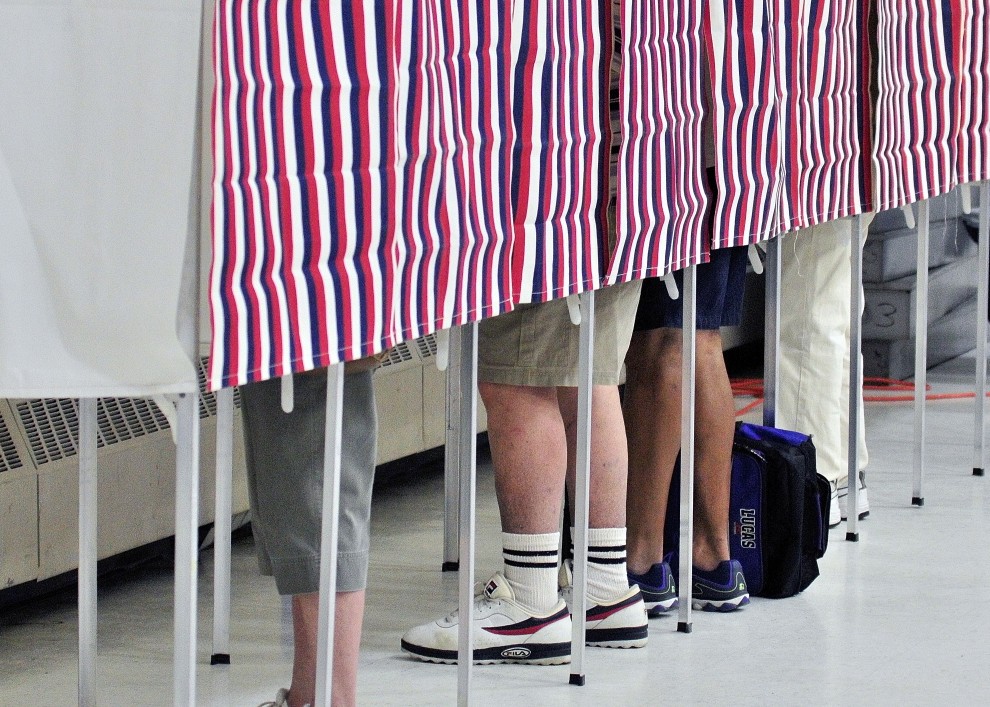MONMOUTH — The selectmen have delayed a decision about who should serve as the town’s election clerks for the next two years.
They did so at their Wednesday night meeting, after the local Democratic Party chairwoman questioned the ability of town employees to monitor local elections fairly when their coworkers or supervisors might be on the ballot.
The party chairwoman, Ginger Jordan-Hillier, raised her concerns as the selectmen were considering eight potential appointees whose names were submitted to them by Town Manager Curtis Lunt. Four people on Lunt’s list are town employees, and Jordan-Hillier suggested it might be difficult for them to be objective in their election duties. She also questioned whether state law allows town employees to serve as election clerks.
“It’s a checks-and-balances issue,” Jordan-Hillier said after the meeting. “If it’s your boss (up for a vote) and you see an irregularity, it’s difficult to point that out.”
Jordan-Hillier added that she was raising the issue not for partisan reasons, but to encourage accountability.
But while Lunt agreed that it would be better to appoint election clerks not on Monmouth’s payroll, he defended the ability of those employees he did recommend to oversee a local election fairly and objectively. Lunt also noted the scarcity of local Republicans who have volunteered to serve as election clerks as a reason he recommended his coworkers for the role.
State election rules state that for each election, a town’s election clerks should come from both major political parties. Those rules also state that town officials should — but are not required to — consider appointing clerks who have been nominated by the local committees of those parties.
In Monmouth, election clerks are paid $8 per hour for their work at the polls every June and November. Much of the local voting process takes place on ballot machines, Lunt said.
The clerks’ tasks include receiving people as they enter the polling station and handing out ballots. After a voter has used one of the machines, a clerk might have to check the ballot if the voter has submitted the name of a write-in candidate, Lunt said. When there are yes-or-no questions for local elections, some of the clerks count those ballots by hand.
Because of the time and labor that’s required, Lunt said, the town has had trouble recruiting local election officials. He said he looks to the municipal employees because they are dependable and, in some cases, are registered with political parties that have failed to nominate election clerks.
“We’ve had trouble getting people, so we’ve put in municipal employees,” Lunt said in an interview Thursday. “These employees aren’t just trying to get work. They’ve been shanghaied, because we need them and they’re reliable.”
Lunt said he thinks other towns also have their employees serve as election clerks.
On Wednesday, he submitted 10 names to the selectmen for consideration as clerks. Six were registered Democrats who had been selected by the town’s party committee, Lunt said, and two were town employees: Laurie Walker, an administrative assistant; and Mary Mead, the town’s deputy treasurer and registrar of voters. He also recommended Republicans David Shaw, the code enforcement officer; and Donna Shaw, an assistant in the Police Department.
“These employees don’t have an inherent bias,” he said. “Just the opposite: They’re honorable people. I think to imply otherwise is egregious.”
It could not be determined immediately what municipal positions, if any, would come up for a vote at the local election in June, when voters also will consider a budget for the 2016-2017 fiscal year. Lunt did not respond immediately to a followup call late Thursday.
According to state election law, the selectmen have until May 1 of each general election year to appoint clerks.
On Wednesday, the selectmen delayed a decision on Lunt’s choices until their April 27 meeting.
Jordan-Hillier suggested that state law does not allow municipal employees to serve as election clerks, basing her opinion on a conversation she said she had with Julie Flynn, Maine’s deputy secretary of state, who oversees elections statewide.
But on Thursday, a spokeswoman for Flynn said the state’s election laws do not prohibit municipal employees from overseeing local elections. Still, she said, that doesn’t mean towns shouldn’t try to get non-employees to run the polls.
“We do believe it’s a perceived conflict of interest, even though it’s not specifically spelled out in law, because you have the same people preparing the election and declaring the result,” spokeswoman Kristen Muszynski said. “There’s no check-and-balance in place.”
Charles Eichacker — 621-5642
Twitter: @ceichacker
Send questions/comments to the editors.




Comments are no longer available on this story